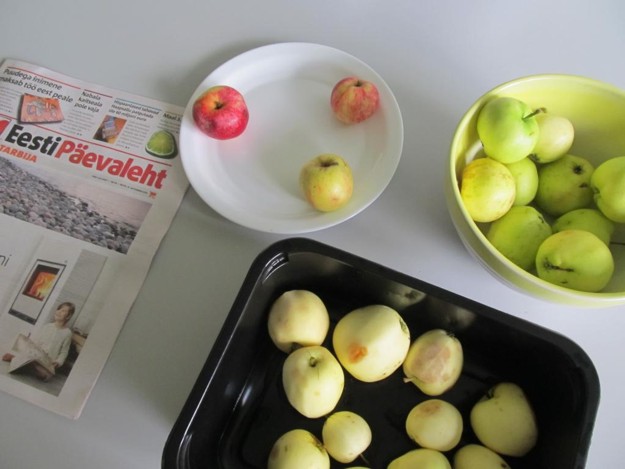 A definitive slice of life in Eesti in late summer is picking apples, but not so much from trees, as from crates left by people’s gates, baskets left in school cafeterias and bowlfuls left in workplace kitchens. If you love your colleagues, you bring them apples. Or, you simply need to get rid of your perishable pommes. They are offered everywhere; free for the taking! The varieties in the communal kitchen in the photo are martsipan (red to yellow; top left) and valge klaar (light yellow-green to translucent). Photo: Riina Kindlam, Tallinn
A definitive slice of life in Eesti in late summer is picking apples, but not so much from trees, as from crates left by people’s gates, baskets left in school cafeterias and bowlfuls left in workplace kitchens. If you love your colleagues, you bring them apples. Or, you simply need to get rid of your perishable pommes. They are offered everywhere; free for the taking! The varieties in the communal kitchen in the photo are martsipan (red to yellow; top left) and valge klaar (light yellow-green to translucent). Photo: Riina Kindlam, Tallinn
Õunad (apples) aren’t news to anyone. Except for maybe some specific local varieties, which may not exist everywhere, such as valged klaarid – directly translated as “white clears”. I had never set eyes (or jaws) on such a thing until visiting Estonia. But I had heard a lot about them.
My father and his sisters reminisced about them, with a strange dreamy gaze; it was something very much connected to their quintessential KODU (home), the one they had to abandon, and they longed for them. Valged klaarid are among the first apples to ripen, hence the first to be enjoyed. But they have to be consumed relatively quickly, since they are a summer variety that doesn’t keep well.
This as opposed to the many varieties of tali/õunad (winter apples), which, if stored correctly, will accompany you happily into the Christmas season and beyond. (Back in the day, Christmas trees were decorated by hanging small, hard sibul/õunad (onion apples) and candies on them.)
It’s rather shocking that the one thing Estonians are sometimes forced to discard and abandon (compost), because they simply can’t deal with the numbers, are apples. Throwing away perfectly good food is NOT something that’s done in Estonia. Cleaning your plate, being mindful to consume prior to the best before date (thereby not throwing anything away) and not light-handedly tossing leftovers are unwritten rules here. Everything grown and picked is stewed, canned, pickled, bottled and frozen, but apples are too big of an opponent for even the feistiest cook.
So you share. You cart, you carry, you spread the love. I currently have 3 martsipan apples left on my desk. When I open my office door in the morning, I’m greeted by the lovely warm scent of them. There were 10 this morning, but three colleagues came by today, and they didn’t just chat, they took apples to their respective desks with them. As per protocol. And you don’t usually hear anyone complaining that they can’t stand to see another apple. They keep riding the apple train. It just goes with the territory; must be in our genes. And it definitely works wonders on the digestion.
Slicing and drying ubinad (apples in dialect) is another option practised by many. They are a glorious chewy snack, perfect to pack along. But if you’ve exhausted all your giveaway opportunities, then the last resort is to cart them out into the middle of a field or into the forest and dump them. Take them to the mets/sead, the wild boars and their friends. That’s definitely better than chopping the õuna/puu down, which one of our neighbors in Saaremaa resorted to, saying she couldn’t handle the volume of fruit the faithful old tree kept producing. Sad scenario.
There are no wild boars in Tallinn, nor do I have a backyard or compost heap, so my only feel-good option is to share what we bring from our island cottage and enjoy the offerings of others. “What do we have in the communal workplace kitchen today? Oh, kurgid (cucumbers), ploomid – and õunad!” It’s one of life’s little joys and makes Estonians interact happily and “shine” (särama), which suits them to a tee.
Riina Kindlam,
Tallinn














